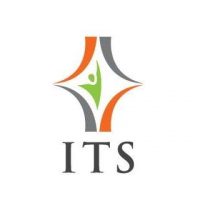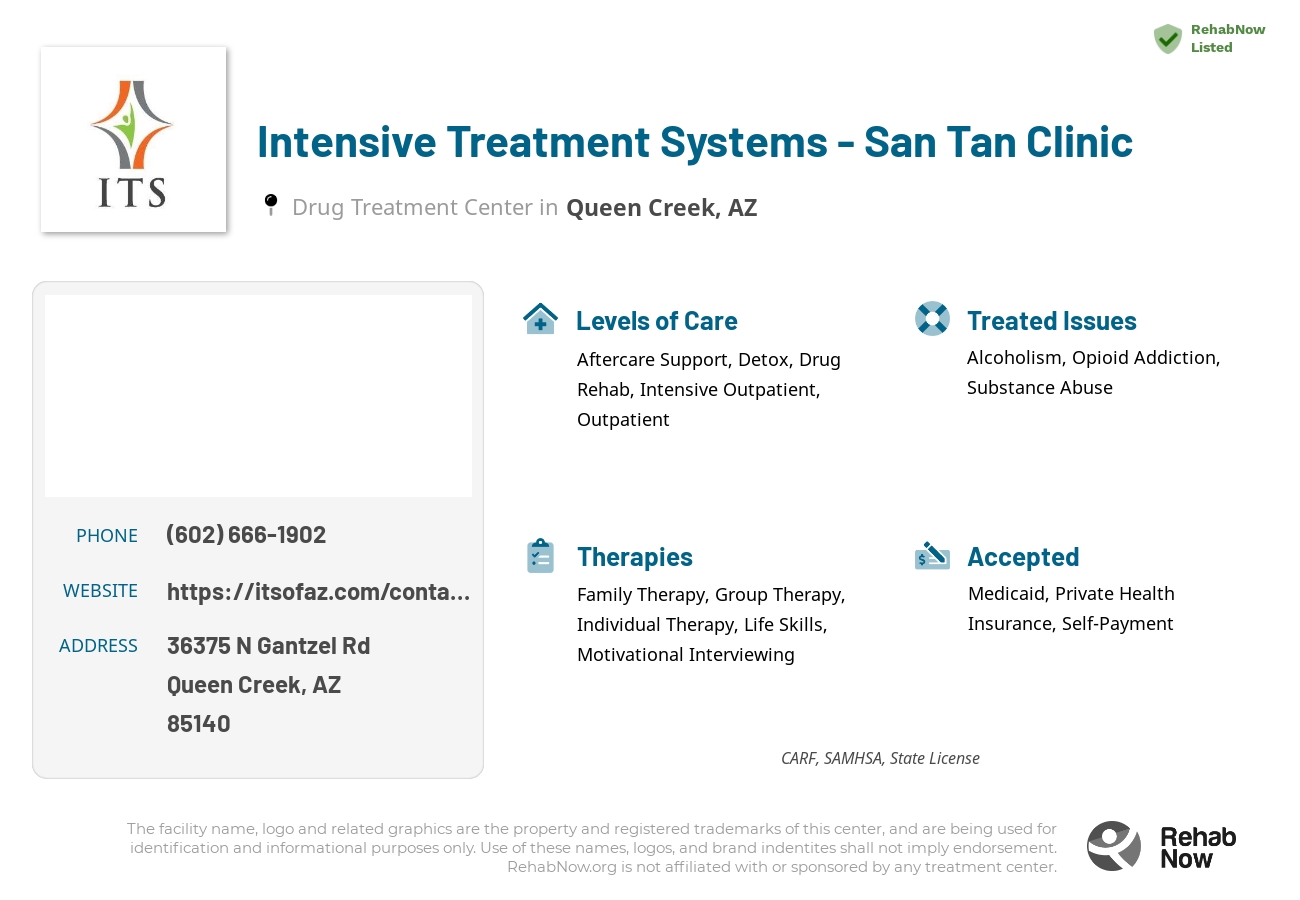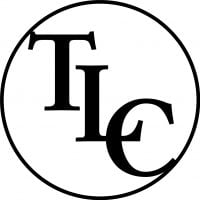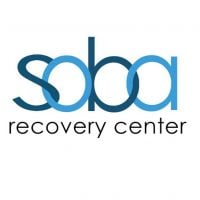Intensive Treatment Systems - San Tan Clinic
Drug Rehab Center in Queen Creek, Arizona
San Tan Clinic is an accredited mental health and substance use treatment facility providing a range of intensive care systems, professional and experienced staff and follow-up/aftercare support in Queen Creek, Arizona.
About Intensive Treatment Systems - San Tan Clinic in Arizona
Intensive Treatment Systems - San Tan Clinic, nestled in Queen Creek, Arizona, specializes in an adult outpatient drug and alcohol rehab. They stand out due to their comprehensive approach, offering medication-assisted treatment (MAT), intensive outpatient programs (IOP), and specialized services for a diverse clientele, including military personnel and pregnant women.
- Medication-Assisted Treatment (MAT): Offers evidence-based pharmacotherapy to help alcohol and/or opioid recovery, reducing cravings and relapse risks.
- Specialized Services: Caters to various groups including pregnant/postpartum women, military personnel, and individuals with dual diagnoses, ensuring a tailored treatment experience.
- Comprehensive Continuum of Care: From crisis intervention to aftercare, including vocational training and peer coaching, supports clients every step of the way towards recovery.
Intensive Treatment Systems - San Tan Clinic is accredited by CARF, illustrating their commitment to providing high-quality care. They collaborate with major insurance providers to ensure accessible treatment options for clients across different backgrounds.
Addressing a range of addiction issues, including alcohol and opioid dependencies, this clinic utilizes MAT alongside intensive counseling sessions. Offering both IOP and general outpatient programs, they ensure flexible yet thorough care tailored to individual recovery paths.
Genders
Ages
Modality
Additional
Accreditations
State License
SAMHSA

CARF
The Commission on Accreditation of Rehabilitation Facilities (CARF) is a non-profit organization that specifically accredits rehab organizations. Founded in 1966, CARF's, mission is to help service providers like rehab facilities maintain high standards of care.
Conditions and Issues Treated
Substance Abuse Treatment is important when getting sober, as it helps addicts learn the skills they need to live a clean life. There are many different kinds of recovery treatment, including but not limited to medication-assisted therapy, behavioral therapeutic approaches, self-help groups, and counseling. Each treatment has its benefits that help addicts recover.
Counseling can help addicts learn the skills they need to live sober lives. It can be used to treat underlying mental health issues, like depression or anxiety, that could lead to relapse. Counseling can also help people find work, deal with family problems, and learn to manage living without drugs.
With so many people addicted to opioids, we need to help those who want to quit. The cycle begins when opioid addicts take opioids for a painful injury. When someone starts taking their medication differently or in excess, it means they’re addicted and at risk of overdosing.
In , detoxing from these types of treatments is the most effective way to beat this. Most facilities begin with medical assistance and then provide counseling services; rehabilitation follows after successful treatment.
Levels of Care Offered
This center offers a variety of custom treatment tailored to individual recovery. Currently available are Aftercare Support, Detox, Drug Rehab, Intensive Outpatient, Outpatient, with additional therapies available as listed below.
Detox is an integral part of recovery and often very hard. Detoxification is the process of letting the body remove the drugs in it. It addresses the physical aspect of addiction. Detox from drugs can be unsafe as the patient undergoes withdrawal symptoms that range from headaches, vomiting, body aches to seizures and cardiac arrests. The main purpose of detox is to keep the drug users comfortable as the drugs leave their system.
Quitting cold turkey is not recommended and can lead to many issues. Detox is best done under medical supervision so that a team of experts can monitor the side effects and complications. Detox, alone, does not guarantee sobriety as the underlying psychological issues are not addressed.
An intensive outpatient program (IOP) is effective for drug rehab, but it can take six months to several years to complete. It’s the most popular type of drug rehab program in the United States. One example of a successful IOP success story is actor and comedian Chris Rock, sober since 1990.
An IOP allows participants to spend nights at home while attending meetings throughout the day. It’s a good way for drug addicts to make a recovery plan in an outpatient setting while still supporting their loved ones.
Alcohol or drug addiction, or co-occurring disorders, are treated in an outpatient program. The patient must attend therapy and other programs at the facility but can return home each night.
Outpatient treatment allows recovering addicts to live at home while receiving addiction treatment. Outpatients can attend group sessions for a few hours per week. Outpatients may also continue to work full time and study/attend school without interruption if they choose.
The accomplishment of completing a drug or alcohol treatment program is just the first step. Once that is complete, aftercare support comes into play. This includes helping people adjust to life without substances outside of guidelines with assistance like getting sober living accommodations and career counseling and AA/NA programs for those who are struggling between sobriety or want continued help in maintaining it once they have completed their initial rehabilitation at an addiction facility.
Aftercare comprises services that help recovering addicts readjust to normal day-to-day activities while working on specific issues. These problems include psychiatric issues, family problems caused by substance abuse, continuing education pursuits if desired during rehab, etc. These can last up to one year+ depending on what’s needed most urgently upon completion of earlier stages.
Therapies & Programs
Different people react differently to various treatment options. Some drug rehabilitation centers offer individualized treatment that caters to the specific needs of a drug addict. The best treatment option varies on an individual depending on the type of drug abused, life history, medical condition of the person, social circumstances, and the environment they live in now.
When a person enters drug rehab, they usually have anti-drug associations such as withdrawal symptoms, stress, cravings, etc. The first step of drug rehab is to detoxify the body from any residual substances in it. Drug rehabilitation centers usually employ trained medical professionals to help in this process. Usually, the initial detoxification lasts for five days, where the person is monitored under close supervision.
Family therapy sessions typically involve the addict and their family members. During these sessions, a therapist will work with everyone involved to help them understand addiction and find healthy ways of coping without substance abuse.
Some addicts might feel embarrassed about their substance abuse problems. By encouraging family members to attend these sessions, therapists can show addicts that they’re not alone in dealing with addiction. Therapists can also work with family members to help them understand addiction and learn how to offer support and encouragement to their loved one as they deal with substance abuse issues.
Attending group therapy at Intensive Treatment Systems - San Tan Clinic in , is a useful way for those seeking sobriety to realize they aren’t the only one going through it.
This is when a group of people on different recovery phases get together and talk about what they’re going through, their triggers, successes, and failures. This can include alternative types of therapies too! Group therapy may occur on an outpatient or inpatient basis with groups that have no pre-existing relationships outside the session, unlike support groups where everyone already knows each other beforehand.
Payment Options Accepted
For specific insurance or payment methods please contact us.
Is your insurance accepted?
Ask an expert, call (888) 674-0062
Intensive Treatment Systems Associated Centers
Discover treatment facilities under the same provider.
- Intensive Treatment Systems - West Clinic Access Point in Phoenix, AZ
- Intensive Treatment Systems in Phoenix, AZ
- Intensive Treatment Systems - Mesa Clinic in Mesa, AZ
Learn More About Intensive Treatment Systems Centers
Additional Details
Specifics, location, and helpful extra information.
Queen Creek, Arizona 85140 Phone Number(602) 666-1902 Meta DetailsUpdated April 15, 2024
Staff Verified
Intensive Treatment Systems - San Tan Clinic Patient Reviews
There are no reviews yet. Be the first one to write one.
Queen Creek, Arizona Addiction Information
Arizona has some of the highest rates of prescription drug abuse in the United States. Methamphetamines, heroin and morphine are among the most commonly abused substances. Prescription pain relievers were prescribed to 348 million people in 2012, enough to medicate every adult in Arizona for 2 full weeks. The number of people with substance use disorders in Arizona has remained relatively constant over the past few years.
Treatment in Nearby Cities
- Fort Defiance, AZ (225.5 mi.)
- Anthem, AZ (56.1 mi.)
- Arizona City, AZ (32.0 mi.)
- Las Vegas, AZ (291.0 mi.)
- Scottsdale, AZ (28.7 mi.)
Centers near Intensive Treatment Systems - San Tan Clinic
The facility name, logo and brand are the property and registered trademarks of Intensive Treatment Systems - San Tan Clinic, and are being used for identification and informational purposes only. Use of these names, logos and brands shall not imply endorsement. RehabNow.org is not affiliated with or sponsored by Intensive Treatment Systems - San Tan Clinic.












